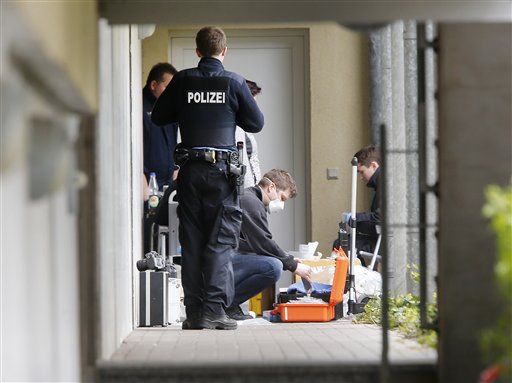Germany foils suspected Boston-style attack, officials say
Published 2:31 pm Thursday, April 30, 2015
BERLIN (AP) — German authorities foiled what they believe may have been an imminent Boston Marathon-style attack on a professional cycling race planned for Friday, seizing a cache of weapons, including a pipe bomb, and chemicals that can be used to make explosives in a raid on a suspected Islamic extremist’s home outside Frankfurt.
Authorities detained a 35-year-old Turkish-German man and his 34-year-old Turkish wife in the raid in the town of Oberursel. The couple, whose names weren’t released in line with Germany privacy rules, had been under surveillance.
Security officials were worried that the couple may have been targeting the one-day Eschborn to Frankfurt race, which draws around 200 professional riders and thousands of spectators on the May Day public holiday. Police said the race would be canceled in case the couple had accomplices, or they placed as-yet undetected explosive devices along the route.
Suspicions were heightened when police recently observed the male suspect, a trained chemist, apparently scouting out the area where the race was due to take place, said Frankfurt’s chief prosecutor, Albrecht Schreiber. The race was supposed to pass through Oberursel.
“The result of the raid shows that our suspicions were confirmed,” Schreiber told reporters Thursday at a news conference in Wiesbaden, the state capital of Hesse.
“According to our current information, we have prevented an attack,” said Stefan Mueller, the chief of police for western Hesse state.
Authorities in Germany have long warned that the country is at high risk of an attack after being named as a target by extremists, including some who have joined the Islamic State group. Mueller declined to say whether authorities believe that known extremist groups were involved.
In the Boston Marathon attack, three people were killed and more than 260 injured when two bombs exploded at the finish line on April 15, 2013.
“Of course we talked about the Boston attack last night,” said Mueller, explaining why security officials decided to go ahead with the raid. The race “is a soft target, and of course, since the Boston Marathon, it’s part of the security assessment for every marathon in Germany, and of course this is true for cycling races too.”
Prosecutors in Frankfurt launched an investigation against the couple in mid-April after an employee at a hardware store informed police about a suspiciously large purchase of a chemical that can be used to make bombs. The couple had used a false name when they bought three liters (nearly a gallon) of hydrogen peroxide, but police were able to identify them and put them under surveillance.
“This hydrogen peroxide triggered an alert,” Frankfurt’s deputy chief prosecutor Stefan Rojczyk told The Associated Press earlier Thursday.
“Three liters is completely unusual,” he said. “You can use it to clear algae from your pond, but you can also use it to build bombs.”
Schreiber said investigators found a functioning pipe bomb, 100 rounds of ammunition, parts of an assault rifle, the hydrogen peroxide, a training rocket for an anti-tank weapon and various other chemicals in the cellar of the couple’s home.
Heavily-armed police wearing masks were involved in the overnight raid, and forensic officers in white suits entered the property and later carted out evidence during daylight hours on Thursday.
Schreiber said the detained man was linked to the extreme Islamic Salafist movement in the Frankfurt area and was known to police for 15 previous offenses. The two suspects would likely appear before a judge later Thursday, he said, adding that two young children found at the premises were being looked after by social services.
“I want to emphasize that an attack was prevented, but it will have to be seen whether a concrete attack against tomorrow’s cycle race was planned,” he said.
Mueller, the police chief, said hydrogen peroxide can be used to produce a substance called TATP. It has been used by extremists to build improvised explosive devices in the past, including by the “shoe bomber” Richard Reid, who tried to detonate a bomb in his shoe during a trans-Atlantic flight.




